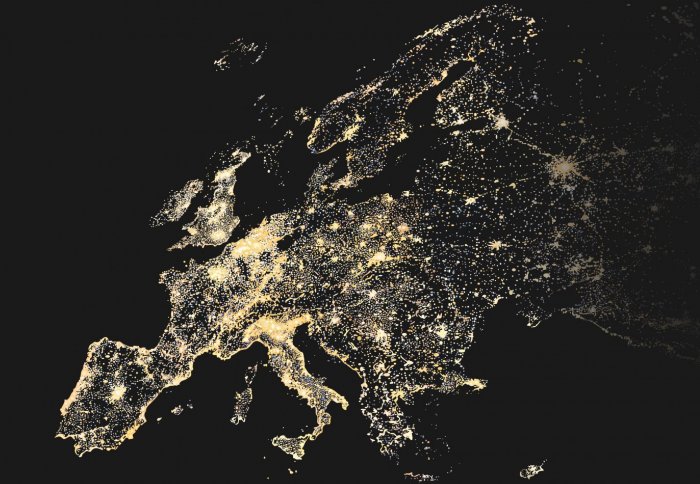

A developer of drones and a creator of sustainable energy storage solutions have been selected as two of the top 35 innovators in Europe.
Mr Talib Alhinai, a research postgraduate from the Department of Aeronautics, and Dr Enass Abo-Hamed, a Royal Academy Enterprise Fellow from the Department of Earth Science and Engineering, are Imperial College London’s laureates in the MIT Technology Review’s 35 Innovators Under 35 2017 list. Imperial alumnus, Joana Moscoso, was also made a laurette in the humanitarian category.

Professor Nigel Brandon
Mr Alhinai and Dr Abo-Hammed were selected by a jury from more than 1,100 applicants. These young innovators are shaping their fields with revolutionary projects and ideas that will transform our daily lives through technology.
Professor Nigel Brandon, Dean-Elect of the Faculty of Engineering at Imperial College London, said: “It’s incredibly hard not to be blown away by the sheer talent of our early career researchers in the Faculty of Engineering. I feel that this important recognition of Talib’s and Enass’s contribution to engineering is really representative of all the great work that is being carried out by our researchers at the College. It is great to see them flying the banner for Imperial and Europe and shows the valuable contribution they are making to solving some of the world’s pressing challenges.”
Talib Alhinai
Talib Alhinai is a research postgraduate in Dr Mirko Kovac’s aerial robotics lab where he is developing flying robots for aerial construction.

Talib Alhinai
Most notably, Mr Alhinai is developing versatile autonomous flying robots capable of printing structures in 3D while in flight. His devices are more stable, robust and precise than conventional drones. He has equipped them with a stabilisation system that allows the drones to approach objects without experiencing turbulence while suspended in mid-air.
Potential applications for the technology include disaster relief, where a swarm of drones could quickly fly out to a devastated region and work together to 3D print shelters using local materials. The technology could also benefit the construction industry where drone swarms could be assigned more dangerous building tasks, which may reduce workplace accidents. In the distant future, these drones may be useful in the colonisation of other planets like Mars, where they could be sent in advance to construct habitats for use when colonists arrive.
Mr Alhinai said: “There is a lot of competition in the drone technology space. This acknowledgement helps to cement my role in the industry in my specific niche of aerial robots for construction. I hope the added exposure that this award brings will, in some way, help to accelerate the rate of the development and adoption of aerial construction robots by opening doors and connecting me to like-minded individuals and organisations.”
Enass Abo-Hamed
Dr Abo-Hamed is the co-founder and CEO at H2GO power Ltd. where she and her team are developing safe and low-cost hydrogen production and storage devices.

Dr Abo-Hamed
Globally, more than one billion people don’t have access to the power grid. An even larger proportion of people suffer regular power outages. Lack of access to regular energy supplies impedes about every aspect of modern life – from recreation, to commerce and healthcare.
Dr Abo-Hamed is developing a new plug and play energy storage system designed to use hydrogen, a renewable energy source, which could in the future provide a stable energy supply for developing countries, especially critical infrastructures such as hospitals and schools.
She and her colleagues have developed smart nanomaterials capable of storing hydrogen in its solid state. The Off-Grid Plug & Play Power has the advantage of being able to react to different temperatures to selectively retain or unleash its hydrogen supply. This allows the system to be used on demand.
Dr Abo-Hammed believes the final prototype will be able to produce 200 kilowatts of power, which is enough to power a hospital during a temporary blackout.
Dr Abo-Hammed said: “I am hopeful that this recognition will shed light on our efforts to solve the challenge of supplying reliable power to people using hydrogen. I also hope it helps bring more supporters to our network to see the size of the environmental and economic opportunities that can come with this field.
“This award strengthens my belief in the energy innovation path that I have chosen to pursue and I hope it will open doors of opportunity that I can build on in the future. I also hope this award, with the exposure it brings, will inspire other young women who are technology oriented to walk down a similar path."
Joana Moscoso
Dr Joana Moscoso, an Imperial alumnus who did her postgraduate degree at the MRC Centre for Molecular Bacteriology and Infection, was also made a laureate in the humanitarian category.

Joana Moscoso
The risk of early abandonment from education and training and unemployment for immigrants in the European Union (EU) is twice as high as it is for non-immigrants, according to an EU report.
To improve this situation for the youngest learners, the biologist Dr Moscoso has created Native Scientist, a digital platform aimed at building bridges between society and science.
Article text (excluding photos or graphics) available under an Attribution-NonCommercial-ShareAlike Creative Commons license.
Photos and graphics subject to third party copyright used with permission or © Imperial College London.
Reporter
Colin Smith
Communications and Public Affairs

Contact details
Email: press.office@imperial.ac.uk
Show all stories by this author




Leave a comment
Your comment may be published, displaying your name as you provide it, unless you request otherwise. Your contact details will never be published.